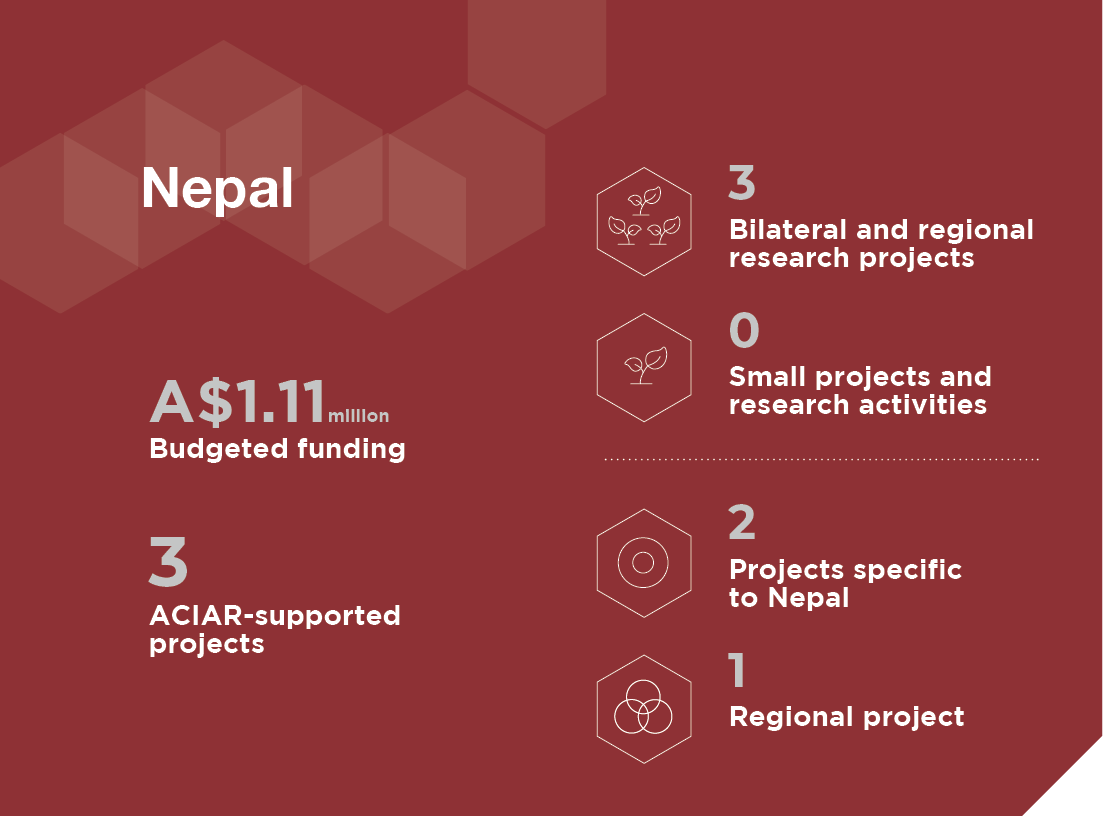Agriculture is the largest economic sector of Nepal, and is highly diverse due to the wide range of climates and geographies in the country.
The challenges facing agriculture in the lowland terai rice–wheat farming systems (part of the Eastern Gangetic Plain) are vastly different to those in the mixed crop–livestock–tree farming systems of the hill and mountain areas. Broadly, however, the challenges include:
- the need for seed system improvements
- degradation of natural resources
- underdeveloped agricultural institutions and policies
- declining availability of labour
- access to productive technologies and mechanisation to improve farm household livelihoods.
Nepal is vulnerable to food insecurity and recurring natural disasters, such as floods, drought, landslides and earthquakes. After the adoption of a new constitution in 2015, Nepal has witnessed 6 changes of government in 7 years. Political stability remains important to manage the economy and ensure continued pursuit of development priorities.
Economic recovery, from both the devasting 2015 earthquakes and the COVID-19 pandemic, will be a long process.
Nepal’s Agriculture Development Strategy 2015–2035 outlines a vision for a self-reliant, sustainable, competitive and inclusive agriculture sector that drives economic growth and contributes to improved livelihoods and food and nutrition security. It conceptualises transformation of Nepal from a society primarily based on agriculture to one that derives most of its income from services and industry. The 20-year strategy aims to halve poverty in less than 10 years through an agriculture-led economy achieving improved governance, higher productivity, profitable commercialisation and increased competitiveness.
The Agriculture Development Strategy also guides policies that include women, and states that all agricultural programs will be designed to benefit women. It promotes women’s organisations and agri-enterprises led by women through specific programs and recommends equal wages for women labourers. The strategy also promotes action to raise awareness of women’s rights to land, and builds the capacity of women to manage irrigation, water resources and finances.
Country priorities
ACIAR has supported collaborative research with Nepal since the early 1990s, including projects on small ruminants, wheat and legumes. The focus for ACIAR during 2023–24 continues to be the engagement of Nepal in a regional program to improve integration of soil, water, crop, livestock and tree components of the farming systems.
Increased farm and forest productivity remains a core priority of Nepal for collaboration with ACIAR to improve food and nutrition security of the rural poor. In the Middle Hills districts, where the impacts of earthquakes and floods remain, our program supports the request of the Nepalese Government to focus primarily on research to support increased timber production from community forests. Another area of requested focus is understanding the implications of federalism on agriculture in Nepal.
Given the common agricultural production challenges across the alluvial plains of Nepal, eastern India and Bangladesh, cooperative research linkages with neighbouring countries will be explored further during 2023–24. The focus will be on conservation agriculture, to address key issues such as declining soil health, burning of rice stubble, falling groundwater levels and inequities in access to water.
Nepal hosts an important regional research body – the International Center for Integrated Mountain Development. ACIAR and DFAT are working with the centre to identify prospective areas for research collaboration.
2023–24 research program
The research program addresses our high-level objectives, as outlined in the ACIAR 10-Year Strategy 2018–2027, as well as specific issues and opportunities identified by ACIAR and our partner organisations.
The following table lists ACIAR-supported projects active in Nepal during 2023–24.
Current and proposed projects in Nepal, 2023–24

